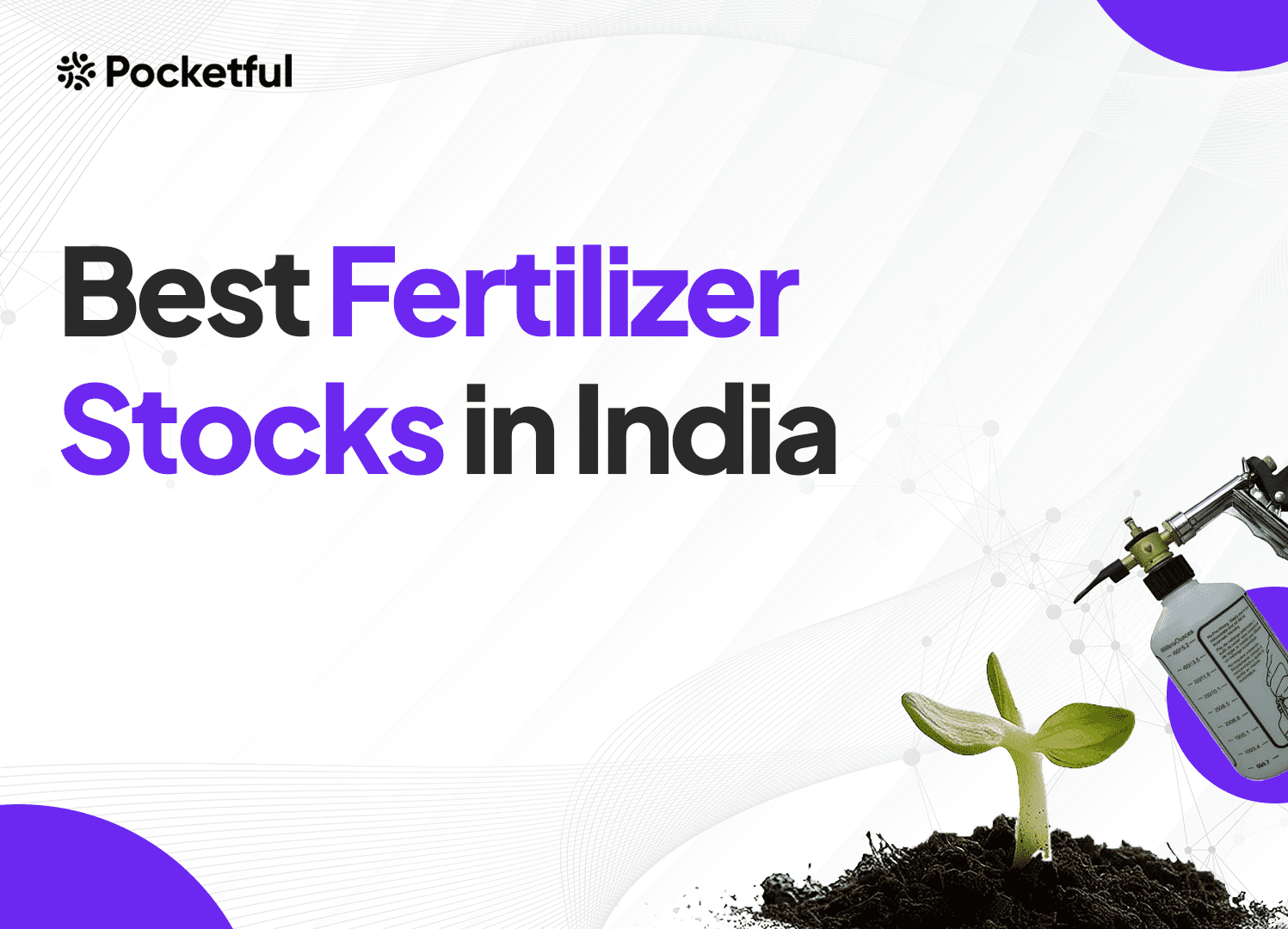| Type | Description | Contributor | Date |
|---|---|---|---|
| Post created | Pocketful Team | Aug-20-24 | |
| Add Share Price | Nisha | Feb-15-25 | |
| Add Share Price | Nisha | Feb-15-25 | |
| Add Share Price | Nisha | Feb-15-25 |

- Blog
- best fertilizer stocks in india
List of Best Fertilizer Stocks in India 2025

The Fertilizer sector is all about nurturing crop growth and ensuring India’s food security. The Indian fertilizer sector is a crucial component of the country’s agricultural framework, playing a vital role in ensuring food security and supporting the livelihoods of millions of farmers. It forms the backbone of India’s rural economy by providing essential nutrients for crop production and protection to enhance the quality of crops. Investors exploring all fertilizer stocks can find significant opportunities within this sector, given its critical role in agriculture and economic growth.
In this blog, let’s look at the best fertilizer stocks in India and the reasons to invest in them.
Overview of the Fertilizer Industry

The Indian fertilizer sector plays a very important role in the country’s agriculture industry, ensuring food security and supporting the livelihood of millions of farmers. The Indian fertilizer industry was valued at $ 41.2 billion in 2023 and is projected to reach a valuation of $70.2 billion by 2032 at a CAGR of 6.1%. Here’s a detailed overview of the segments of the fertilizer sector:
1. Nitrogen Based Fertilizers (N)
- Urea: It is the most widely used fertilizer in India and is heavily subsidized by the government.
- Ammonium Sulfate: It is used in smaller quantities.
- Calcium Ammonium Nitrate (CAN): Another nitrogen fertilizer with moderate usage.
2. Phosphate Based Fertilizers (P)
- Diammonium Phosphate (DAP): The primary phosphatic fertilizer used in India.
- Single Super Phosphate (SSP): It is used in smaller quantities but is crucial for certain crops.
3. Potassium Based Fertilizers (K)
- Muriate of Potash (MOP): It is the widely used potash fertilizer in India and is largely imported.
4. Complex Fertilizers: These are blended fertilizers containing two or more nutrients (NPK) and are customized for specific crop needs.
Top Fertilizer Stocks Based on Market Capitalization
The top Fertilizer stocks in 2025 are:
The fertilizer stocks have been listed in descending order based on their market capitalization in the table below:
| Company | Market Capitalization (in INR Crores) | Current Market Price (in INR) | 52-Week High (in INR) | 52-Week Low (in INR) |
|---|---|---|---|---|
| Fertilizers & Chemicals Travancore Ltd. | 59,864 | 926 | 1187 | 440 |
| Coromandel International Ltd. | 51,297 | 1,741 | 1,780 | 1,019 |
| Chambal Fertilizers & Chemicals Ltd. | 19,878 | 497 | 575 | 258 |
| Deepak Fertilizers & Petrochemicals Corporation Ltd. | 12,068 | 956 | 1,036 | 450 |
| Rashtriya Chemicals & Fertilizers Ltd. | 10,487 | 190 | 245 | 108 |
Read Also: List of Best Agricultural Stocks in India
Best Fertilizer Stocks in India Based on Market Capitalization – An Overview
The best fertilizer stocks in India are given below, along with a brief overview:
1. Fertilizers and Chemicals Travancore Ltd. (FACT)
It is one of India’s oldest and largest fertilizer and chemical manufacturing companies. It was founded in 1943 and is headquartered in Kochi, Kerala. FACT began as a small-scale fertilizer manufacturing unit and, over the decades, has grown into a significant player in the fertilizer industry. FACT primarily produces fertilizers and chemicals. It was transformed into Kerala Public Sector Enterprise in 1960 and subsequently became a central public sector undertaking in 1962.
| Y Return (%) | 3Y Return (%) | 5Y Return (%) |
|---|---|---|
| 1.41% | 544.87% | 1953.06% |
2. Coromandel International Ltd.
It was founded in 1961 and is headquartered in Hyderabad, Telangana. The company is a subsidiary of the EID Parry group, which is one of the oldest and most reputed business groups in India. Over time, Coromandel International evolved and expanded its operations to become one of the leading agrochemical companies in the country. Its primary products include fertilizers and crop protection products such as insecticides, fungicides, herbicides, and plant growth regulators.
| Y Return (%) | 3Y Return (%) | 5Y Return (%) |
|---|---|---|
| 60.02% | 130.86% | 174.64% |
3. Chambal Fertilizers & Chemicals Ltd.
It was established in 1985 and headquartered in New Delhi. The company is part of the KK Birla Group, a prominent business conglomerate in India. It was set up to contribute to the agricultural sector by providing high-quality fertilizers. Its primary product is urea. It is one of the largest producers of urea in India and also produces a variety of fertilizers and agrochemicals.
| Y Return (%) | 3Y Return (%) | 5Y Return (%) |
|---|---|---|
| 47.55% | 39.46% | 224.02% |
4. Deepak Fertilizers & Petrochemicals Corporation Ltd.
Incorporated in 1979, Deepak Fertilizers and Petrochemicals Corporation Ltd. is in the business of fertilizers and industrial chemicals, bulk and specialty fertilizers, farming diagnostics and solutions, and technical ammonium nitrate. The company has developed Creaticity, a ten-acre property that includes India’s first and largest destination for home & interiors, food & beverage, and differentiated entertainment.
| Y Return (%) | 3Y Return (%) | 5Y Return (%) |
|---|---|---|
| 103.13% | 87.09% | 934.39% |
5. Rashtriya Chemicals & Fertilizers Ltd.
It was founded in 1978 and is headquartered in Mumbai, Maharashtra. RCF is an Indian central public sector undertaking and was formed after the reorganization of the Fertilizer Corporation of India (FCI). It is the fourth largest government-owned fertilizer producer. This reorganization was aimed at improving efficiency and productivity in the fertilizer sector. Its primary products are fertilizers and industrial chemicals.
| Y Return (%) | 3Y Return (%) | 5Y Return (%) |
|---|---|---|
| -7.03% | 79.75% | 214.24% |
Top Fertilizer Stocks Based on 1-Year Return
The top fertilizer stocks in 2025 are:
| S.NO. | Fertilizer Company | 1-Year Return |
|---|---|---|
| 1 | Fertilizers & Chemicals Travancore Ltd. | 108.58% |
| 2 | National Fertilizers Ltd. | 102.05% |
| 3 | Chambal Fertilizers & Chemicals Ltd. | 90.58% |
| 4 | Deepak Fertilizers & Petrochemicals Corporation Ltd. | 72.78% |
| 5 | Rashtriya Chemicals & Fertilizers Ltd. | 75.14% |
Read Also: List of Best Chemical Stocks in India
Best Fertilizer Stocks in India Based on One Year Return – An Overview
The best fertilizer stocks according to 1-Year return are given below, along with a brief overview:
National Fertilizers Ltd (NFL)
It was established in 1974 and is headquartered in Noida, Uttar Pradesh. NFL was incorporated as a public sector undertaking under the administrative control of the Ministry of Chemicals and Fertilizers, Government of India. The company holds a Navratna status and is the largest government-owned Urea fertilizer producer in India. It was established to enhance the country’s production and supply of fertilizers. Its primary products are fertilizers and industrial products like sodium nitrate, ammonia, nitric acid, etc.
Overviews of the remaining companies have been given above.
Key Performance Indicators (KPIs)
| Company | ROE (in %) | ROCE (in %) | Debt to Equity | P/E (X) | P/B (X) |
|---|---|---|---|---|---|
| Fertilizers & Chemicals Travancore Ltd. | 10.62 | 33.93 | 1.29 | 2,316.25 | 43.58 |
| Coromandel International Ltd. | 17.43 | 24.04 | 0.01 | 35.13 | 5.45 |
| Chambal Fertilizers & Chemicals Ltd. | 17.54 | 20.89 | 0.24 | 14.37 | 2.74 |
| Deepak Fertilizers & Petrochemicals Corporation Ltd. | 8.18 | 12.25 | 0.75 | 22.84 | 2.24 |
| Rashtriya Chemicals & Fertilizers Ltd. | 4.89 | 7.28 | 0.71 | 62.36 | 2.28 |
| National Fertilizers Ltd. | 5.87 | 8.03 | 1.6 | 24.86 | 2.56 |
Benefits of Investing in Fertilizer Stocks

Investing in fertilizer stocks can have several advantages, some of which are listed below:
- High Growth Potential: The sector offers robust growth prospects, making it an attractive investment opportunity. India’s population is continuously growing, driving the need for increased agricultural production to ensure food security.
- Untapped Markets: Rural areas represent a significant growth opportunity for the sector. It’s an essential industry with a continuous demand due to the fundamental need for food production.
- Technological Advancements: Precision farming and new fertilizer technologies can improve efficiency and crop yields.
- Sustainable Practices: Growing awareness of organic farming and bio-fertilizers offers new growth avenues.
- Capacity Expansion: Increasing domestic production capacity to reduce import dependence.
- Government Initiatives: Continued support through favorable policies and investments in infrastructure, as well as Government policies such as the Nutrient-Based Subsidy (NBS) scheme and Direct Benefit Transfer (DBT) system, improve the sector’s efficiency and transparency.
Factors to Consider While Investing in Fertilizer Stocks
There are various factors one should take into account before investing in fertilizer stocks:
- Government Policies and Subsidies: Understand the government’s subsidy policies, as they significantly impact the profitability of fertilizer companies. Changes in subsidy disbursement or amounts can affect the financial performance of the companies.
- Regulations: Stay updated on government regulations and policies affecting the sector, including pricing controls and environmental regulations.
- Market Demand: Analyze the demand for fertilizers based on agricultural cycles, crop patterns, and farmer incomes. A good monsoon season usually boosts demand.
- Crop Prices: Higher crop prices generally lead to increased fertilizer use as farmers invest more in inputs to maximize yields.
- Raw Material Availability: Fertilizer production relies on raw materials such as natural gas, phosphates, and potash. Fluctuations in global prices can impact profitability.
- Supply Chain Stability: Assess the stability and reliability of the supply chain, including sourcing of raw materials and distribution networks.
- Global Market Dynamics: Understand the impact of global trade dynamics on the sector. India imports a significant portion of its phosphatic and potassic fertilizers, so global market conditions can influence domestic prices and availability.
- Environmental and Sustainability Factors: Companies focusing on sustainable and environmentally friendly practices, such as bio-fertilizers and organic farming, may have long-term growth potential.
- Regulatory Compliance: Ensure companies comply with environmental regulations to avoid potential fines and disruptions.
- Technological Advancements: Companies investing in precision agriculture and advanced technologies can improve fertilizer efficiency and crop yields, enhancing long-term growth prospects.
Future of the Fertilizer Sector in India
The Indian fertilizer sector is poised for steady growth, driven by rising agricultural demand, supportive government policies, and technological advancements. Companies producing the best fertilizer in India are focusing on innovative solutions to meet the evolving needs of farmers while ensuring environmental sustainability. Addressing challenges such as subsidy management, environmental sustainability, and dependency on imports will be crucial for long-term stability and growth. The sector will likely see increased investment in research and development, aiming to improve efficiency and promote sustainable agricultural practices.
Read Also: List Of Best Pharma Stocks in India
Conclusion
Investing in the Indian fertilizer sector offers substantial growth potential driven by rising agricultural demand, government support, technological advancements, and a focus on sustainable practices. While challenges such as subsidy management, environmental impact, and global price volatility exist, the sector’s fundamental role in food production and strong demand outlook make it an attractive investment opportunity. Long-term investors can benefit from the sector’s essential nature and its critical role in supporting India’s agricultural and economic development. However, it is advised to consult a financial advisor before investing.
Frequently Asked Questions (FAQs)
Why are fertilizers subsidized in India?
Subsidies are provided to make fertilizers affordable for farmers, thereby supporting agricultural production and food security. It helps farmers to access essential nutrients for their crops at lower costs.
What kind of market structure does the Fertilizer Sector have?
The fertilizer sector in India operates as an oligopoly with significant competition among a few large players, both public and private. Government intervention through subsidies and regulation plays a crucial role in maintaining competitive prices and preventing monopolistic control.
What is the Nutrient-Based Subsidy (NBS) scheme?
The NBS scheme provides subsidies based on the nutrient content of phosphatic and potassic fertilizers, promoting balanced fertilization and encouraging the use of multiple nutrients for better crop health.
What is the Direct Benefit Transfer (DBT) system in fertilizers?
The DBT system ensures that subsidies reach the intended beneficiaries directly, improving the efficiency and transparency of subsidy distribution. It aims to reduce leakages and ensure timely disbursement to farmers.
Which companies manufacture fertilizers in India?
Fertilizers & Chemicals Travancore Ltd., Coromandel International Ltd., Chambal Fertilizers & Chemicals Ltd., etc., are some of the prominent fertilizer companies in India.
Disclaimer
The securities, funds, and strategies discussed in this blog are provided for informational purposes only. They do not represent endorsements or recommendations. Investors should conduct their own research and seek professional advice before making any investment decisions.